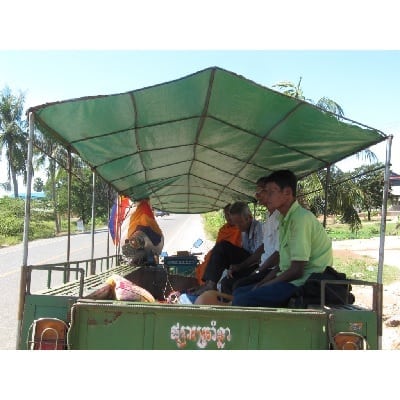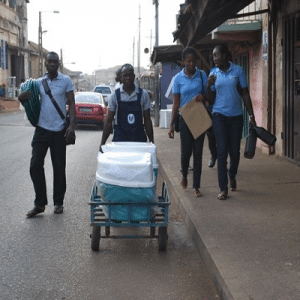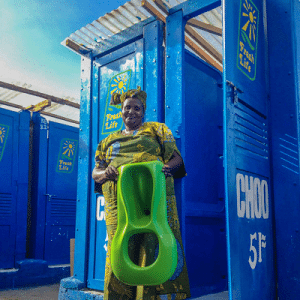
Agriculture
January 22, 2024
Blue Box Toilet and Sanivation Container-Based Sanitation (CBS) Waste Collection Service
Read SolutionImplemented by
Sanivation

Updated on August 4, 2024
·Created on August 27, 2015
Partners for Development Taxi Service is a transportation system for service in rural Cambodia.
Partners for Development Taxi Service is a transportation system for rural Cambodians that links various villages to each other and to hospitals for emergency/mass transport. A motor bike, called a Remorque, pulls a 5.25 m2 cart that can fit about 25 people to the nearest desired location (usually a hospital or healthcare center).
Target SDGs
SDG 3: Good Health and Well-Being
SDG 9: Industry, Innovation and Infrastructure
Market Suggested Retail Price
$1.00
Target Users (Target Impact Group)
Household, Small and Medium-sized Enterprises
Distributors / Implementing Organizations
Partners for Development, through local government management and local private sector transport providers.
Competitive Landscape
Direct competitors include Zambulance.
Countries
Cambodia
Manufacturing/Building Method
Still in development
Intellectural Property Type
Select Type
User Provision Model
If an end user or an end user's community pays the 1 USD monthly fee, they can have unlimited access to the transportation service.
Distributions to Date Status
Unknown. The scheduled route of the service results in about 4 uses every day per product. Interview with representative
Area of cart (m^2)
5.25 m2
Frame material
Metal and rubber/plastic
Hitch type
Motor bike
Maximum speed (km/h)
Unknown
Patient capacity (#)
25 patients
Design Specifications
Specifications:
The transport network that PFD and local communities developed worked much like a public bus system. Families paid a low fixed monthly rate in exchange for regular transportation to schools, markets, health facilities and other popular destinations. Managed by the community, the system sought to leverage the high demand for inexpensive transport to create a strong incentive among community members to keep the system running for ante-natal care.
The service includes a motor bike, called a "Remorque", which pulls a large cart to the desired destination.
Cart dimensions (LxW) (cm): 350 x 150 (roof height not given, but can be comfortably sat under)
Technical Support
Partners for Development oversees their entire operation and analysis.
Replacement Components
Some parts of the cart are repairable.
Lifecycle
Unknown
Manufacturer Specified Performance Parameters
Partners for Development plans to provide 24 hour access to transportation in rural villages that otherwise would not have access.
Vetted Performance Status
Unknown
Safety
Unknown
Complementary Technical Systems
Unknown
Academic Research and References
Nicholl, J., West, J., Goodacre, S., Turner, J., 2007, The relationship between distance to hospital and patient mortality in emergencies: an observational study. Emergency Medicine Journal. 4(9):665-668.
Razzak, J. A., Kellermann, A. L., 2002, Emergency medical care in developing countries: is it worthwhile? Bull World Health Organ. 80(11):900-905.
Kobusingye, O.C., et al., 2005, Emergency medical systems in low- and middle- income countries: recommendations for action. Bull World Health Organ. 83(8):626-631.
Macintyre, K., Hotchkiss, D.R., 1999, Referral revisited: community financing schemes and emergency transport in rural Africa. Social Science & Medicine. 49(11):1473-1487.
Fourneir, P., Dumont, A., Tourigny, C., Dunkley, G., Drame, S., 2009, Improved access to comprehensive emergency obstetric care and its effect on institutional maternal mortality in rural Mali. Bull World Health Organ. 87(1):30-38.
“Partners for Development.” n.d. Pfd.Org. Accessed July 7, 2024. https://pfd.org/
“Who Are We?” 2024. Zambikes. March 8, 2024. https://www.zambikes.org/about-us/
“Partners for Development?» Programs.” n.d. Pfd.Org. Accessed July 7, 2024. https://pfd.org/our-programs/cambodia/80
Compliance with regulations
None
Evaluation methods
Project feasibility will be measured based on the following parameters:
1. The percentage of households subscribed to the transportation system;
2. The percentage of village loan funds which, including reinvested interest and any CC subsidies, remain at or above 90% of the initial capitalization levels at the end of year 2.
Impact on maternal/neonatal health will be measured through changes in the following indicators:
1. The number and percentage of deliveries taking place in a health facility;
2. The number and percentage of pregnancies receiving at least 4 ante-natal examinations

Agriculture
January 22, 2024
Implemented by
Sanivation

Agriculture
January 19, 2024
Implemented by
Clean Team Ghana

Agriculture
August 17, 2024
Implemented by
Sanergy

Agriculture
January 17, 2024
Implemented by
Sanima

Agriculture
June 12, 2024
Implemented by
Drones for Development

Agriculture
June 8, 2024
Implemented by
GiftedMom

Agriculture
June 6, 2024
Implemented by
emocha Mobile Health

Agriculture
June 29, 2024
Implemented by
Ker-Jiun Wang

Agriculture
June 29, 2024

Agriculture
June 28, 2024
Implemented by
Pipistrel

Agriculture
January 22, 2024
Implemented by
Sanivation

Agriculture
January 19, 2024
Implemented by
Clean Team Ghana

Agriculture
August 17, 2024
Implemented by
Sanergy

Agriculture
January 17, 2024
Implemented by
Sanima

Agriculture
June 12, 2024
Implemented by
Drones for Development

Agriculture
June 8, 2024
Implemented by
GiftedMom

Agriculture
June 6, 2024
Implemented by
emocha Mobile Health

Agriculture
June 29, 2024
Implemented by
Ker-Jiun Wang

Agriculture
June 29, 2024

Agriculture
June 28, 2024
Implemented by
Pipistrel

Agriculture
January 22, 2024
Implemented by
Sanivation

Agriculture
January 19, 2024
Implemented by
Clean Team Ghana

Agriculture
August 17, 2024
Implemented by
Sanergy

Agriculture
January 17, 2024
Implemented by
Sanima

Agriculture
June 12, 2024
Implemented by
Drones for Development

Agriculture
June 8, 2024
Implemented by
GiftedMom

Agriculture
June 6, 2024
Implemented by
emocha Mobile Health

Agriculture
June 29, 2024
Implemented by
Ker-Jiun Wang

Agriculture
June 29, 2024

Agriculture
June 28, 2024
Implemented by
Pipistrel
Have thoughts on how we can improve?
Give Us FeedbackNotifications